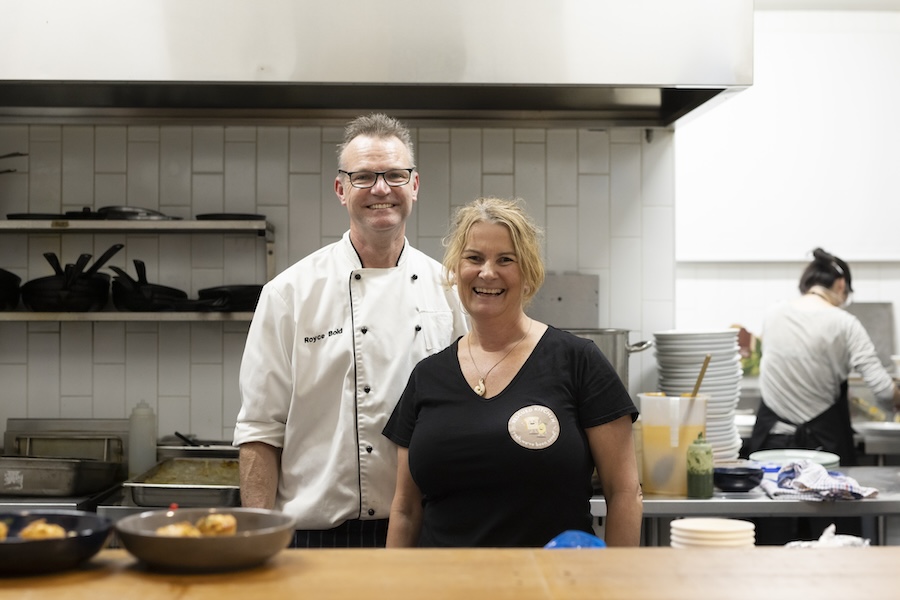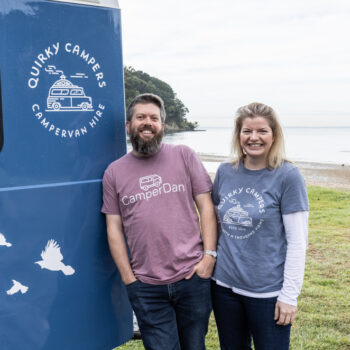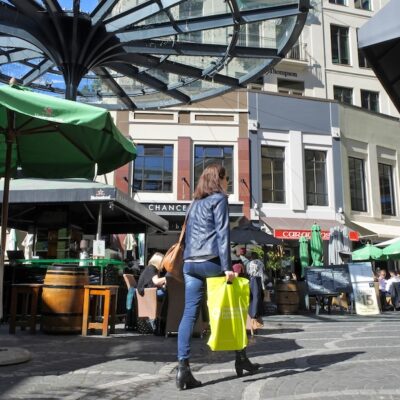Navigating challenges: Small business resilience amidst sales decline
Pictured above: Royce Bold (Head of Operations) and Diane Stanbra (Co-Founder, Head of Sales, Marketing and Communications) of Rescued Kitchen.
As small businesses in Aotearoa grapple with a significant decline in sales, recent data from Xero reveals a challenging economic landscape. Despite an overall drop in small business sales some enterprises like Rescued Kitchen are defying the odds through innovative strategies and showing resilience.
In July, Xero’s Small Business Insights (XSBI) data for the June quarter provided a stark view of the economic realities facing small businesses in Aotearoa. The report revealed a significant decline in small business sales, with a 1.5 percent drop year-on-year (y/y), marking the largest monthly fall since the early COVID-19 lockdowns. Despite these challenging conditions, some small businesses are demonstrating remarkable resilience and strategic innovation to weather the storm.
Paul Churchman, Xero NZ Head of Sales, highlights the concerning trend: “After what looked to be a more positive start to 2024, this sharp decline in sales suggests small businesses are not faring so well. The latest inflation figure from Statistics New Zealand was 3.3 percent for the June quarter. Adjusting the nominal XSBI data to real data, this indicates small business sales are even weaker, down 4.8 percent in the June quarter.”
The XSBI report indicates that every industry tracked experienced a sales decline in June, with the hardest-hit sectors being hospitality, construction, and retail trade. Hospitality, in particular, saw a dramatic 10 percent decline, while construction and retail trade experienced drops of 10 percent and 11.4 percent, respectively. The report also highlighted significant regional variations, with Waikato, Taranaki, and Manawatu-Whanganui facing the steepest sales drops, while Northland was the only region to see a positive rise (+1.5 percent y/y).
The report’s data paints a troubling picture of the economic strain on small businesses. Churchman notes, “All industries experienced a sales decline in June. These declines reflect a broader trend where consumer spending is tightening, particularly in sectors reliant on discretionary spending or major purchases.”

Despite these adverse trends, small businesses have continued to demonstrate strength in job creation. Jobs rose by 6.7 percent year-on-year, though this is slightly below the seven percent rise recorded in the previous quarter. Churchman observes, “This steady jobs growth reflects how small business owners remain hopeful about the future, ensuring the sector is prepared and fully resourced for when economic conditions improve.”
Wages also saw a significant increase, rising by 3.6 percent year-on-year in the June quarter, the largest rise since early 2023. This wage growth indicates a continued commitment by small businesses to attract and retain talent despite financial pressures. “This acceleration of wage growth suggests small businesses remain eager and are currently able to pay larger wages to attract talent, despite the challenging economic climate,” says Churchman.
However, Churchman also cautions about the sustainability of this trend: “Paired with the continued jobs growth, this raises the question of how long small businesses will be able to sustain this trend if sales don’t pick up.”
Amid the broader economic difficulties, some small businesses are managing to not just survive but thrive. Royce Bold, Head of Operations at Rescued Kitchen, shares insights into how his company is navigating the current economic climate. Since its inception in March 2022, Rescued Kitchen has achieved significant milestones. “Our customers, our growth, and the impact we have made towards our goal of reducing food waste have been our highlights. We’ve rescued over 75 tonnes of food up to June, up 25 tonnes from the previous quarter,” Bold says.
One notable achievement for Rescued Kitchen has been their participation in the Ellen MacArthur Foundation Big Food Redesign Challenge and the launch of the world’s first upcycled tortilla wrap in collaboration with Remarkable Tortillas. “The Remarkable Rescued tortilla wrap is a game-changer in our mission to combat food waste. It represents the kind of innovation that is crucial for both our business and the environment,” says Bold.
Despite these successes, Bold acknowledged the challenges faced. “Our main challenge has been the lack of equipment and technology to process the enormous volumes of surplus food and meet demand. We used this challenge to build the business case for our first capital raise to invest in the necessary equipment and technology,” he explaines.
The current economic climate has certainly put pressure on many businesses, but Bold has noted positive trends in their operations. “Thankfully, our sales are increasing on average by 70 percent month on month. Our forecasts are showing strong growth, which is encouraging.”
Addressing the issue of cash flow, Bold shares strategies that have helped Rescued Kitchen manage this critical aspect of their business. “Cash flow is always a challenge. We work hard to build up our cash reserves, save diligently, and maintain tight control of our costs. We also have strong relationships with our customers and suppliers to avoid lengthy payment terms,” he says.

Looking at broader consumer trends, Bold notes a growing awareness of food waste and sustainability. “We hope that consumers and businesses are becoming more mindful of food waste. Awareness of the problem and the solutions we offer is growing, which is a positive sign. We’ve seen increased engagement and positive feedback from consumers and businesses alike,” he says.
Innovation and collaboration remain central to Rescued Kitchen’s strategy for growth. “Our business model is centred on collaboration. Our partnership with Remarkable Tortillas to develop the upcycled tortilla wrap is an example of how we can make a significant impact on reducing food waste and drive business growth.”
Rescued Kitchen is also in the process of pursuing B Corp certification and Upcycled Food certification for their Rescued Bread Flour. Bold expresses excitement about these certifications, “We’ve submitted and are in the assessment phase for B Corp certification. We are also thrilled about the Upcycled Food certification for our Rescued Bread Flour, which is a milestone as it’s the first time this certification is available outside of the US and Canada.”
In light of the current economic challenges, Churchman’s advice for small business owners remains crucial: “It’s essential for business owners to stay across their finances and work closely with a financial advisor. This will help them make informed decisions and navigate the challenging road ahead.”







